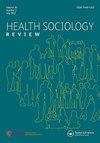切入剖宫产的讨论:作为社会实践的生育实践
IF 2.5
2区 医学
Q2 HEALTH POLICY & SERVICES
引用次数: 5
摘要
摘要尽管剖腹产会带来健康风险,但女性在剖腹产中发现了吸引力(或者至少是对剖腹产的抵抗力较低),我调查了这一决定是如何在一种对女性身体深感焦虑的文化中融入女性性别社会化的更广泛模式的。我回顾了关于剖腹产的学术研究,并使用社会实践理论来绘制化身理论、性别社会学和剖腹产具体实践之间可能的联系点。我认为剖腹产是一种社会实践的组成部分,并采用一个实践框架来分析女性选择(或同意)剖腹产的动机。我详细介绍了医院的物质性、女性身体的医学化以及女性对立的身体关系,以揭示剖腹产作为现代分娩模式的一部分被正常化和隐形的一些不太明显的原因。应对剖腹产进一步升级的干预措施可能会考虑这一决定如何与其他社会实践相一致。我的结论是,积极应对使剖腹产如此具有吸引力的社会条件,可能会辐射到女性生活的其他方面,在这些方面,规范女性气质的做法被证明同样具有限制性。本文章由计算机程序翻译,如有差异,请以英文原文为准。
Cutting through the discussion on caesarean delivery: birth practices as social practices
ABSTRACT Women are finding appeal in (or, at minimum, a lower level of resistance to) caesarean delivery despite the health risks that it poses, and I investigate how this decision figures into a broader pattern of women's gender socialisation within a culture that is deeply anxious about women's bodies. I review scholarship on caesarean delivery, and use social practice theory to map possible contact points between theories of embodiment, a sociology of gender, and the specific practice of caesarean section. I consider caesarean delivery as a component of a social practice, and adopt a practice framework to analyze women's motivation for selecting (or consenting to) caesarean delivery. I detail the materiality of the hospital, the medicalisation of women's bodies, and women's antagonistic body relationship to reveal some of the less immediately apparent reasons why caesarean delivery has been normalised and rendered invisible as part of the pattern of modern childbirth. Interventions to address the further escalation of caesarean delivery might consider how this decision aligns with other social practices. I conclude that activism addressing the social conditions that make caesarean delivery so attractive may radiate out to other aspects of women's lives where the practices of normative femininity have proven equally restrictive.
求助全文
通过发布文献求助,成功后即可免费获取论文全文。
去求助
来源期刊

Health Sociology Review
Multiple-
CiteScore
7.50
自引率
0.00%
发文量
14
期刊介绍:
An international, scholarly peer-reviewed journal, Health Sociology Review explores the contribution of sociology and sociological research methods to understanding health and illness; to health policy, promotion and practice; and to equity, social justice, social policy and social work. Health Sociology Review is published in association with The Australian Sociological Association (TASA) under the editorship of Eileen Willis. Health Sociology Review publishes original theoretical and research articles, literature reviews, special issues, symposia, commentaries and book reviews.
 求助内容:
求助内容: 应助结果提醒方式:
应助结果提醒方式:


